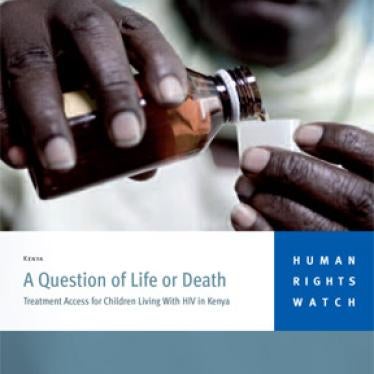(New York) - The Kenyan government should ensure that strong human rights protections are included in plans for expanded home-based HIV counseling and testing, Human Rights Watch said today in a letter to the public health minister. Earlier in 2009, Kenya started testing people for HIV in their own homes, and aims to test more than four million Kenyans - adults and children - in 2010, according to the new Kenya National HIV/AIDS Strategic Plan.
Home-based counseling and testing can improve accessibility to HIV testing but should be conducted in a way that protects human rights and minimizes risks of stigma and abuse, Human Rights Watch said. Research by Human Rights Watch has shown that HIV-positive mothers and children frequently are stigmatized in Kenya, and suffer violence, abuse, and abandonment when their family members find out they are HIV-positive.
"Expanding HIV testing is critically important in efforts for universal access to treatment," said Juliane Kippenberg, senior researcher in the Children's Rights Division at Human Rights Watch. "As Kenya's government takes steps to ensure that everyone knows their HIV status, it should also ensure that everyone who tests positive is able to get the needed care and is protected from discrimination and abuse."
Testing children at their homes poses special challenges, Human Rights Watch said. Outreach workers conducting counseling and testing, for example, must get consent from older children if they are pregnant, married, already a parent, or engaged in risky sexual behavior. These children have a right to refuse interference from parents or relatives. In the past, some children have been kicked out of the home, exploited or physically ill-treated by their relatives when their status became known. Human Rights Watch recommended to the government that social workers be present during the testing to assist the family with any potential conflict, and where abuses occur, to refer family members to competent, free medical services.
Vulnerable groups, including women and children, often face difficulty getting and staying on treatment because they cannot afford transport, fees for medical tests, and adequate food to be able to tolerate the treatment. This is of particular importance for children, who need adult support to access and adhere to treatment, and for whom treatment is less widely available than for adults.
Human Rights Watch also called on the government to create an independent oversight mechanism to respond to complaints about problems with confidentiality, consent, linkages to other health services, and other abuse based on HIV status.
"Human rights protections are sometimes seen as a barrier to the expansion of HIV counseling and testing services," Kippenberg said. "In fact, attention to human rights improves access and ensures that testing translates to care. Kenya has an opportunity to slow HIV transmission and treat AIDS, but this program will work only if people receive the protection and services they need."







